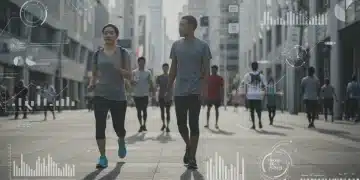Healthcare transportation assistance for elderly patients

Healthcare transportation assistance for elderly patients is essential for ensuring they access necessary medical appointments, improve independence, and enhance overall well-being through reliable and convenient transportation solutions.
Healthcare transportation assistance for elderly patients is crucial for ensuring they can access medical appointments and necessary healthcare services. Have you ever wondered how lack of transportation might impact their health? In this article, we’ll explore the challenges and solutions surrounding this important issue.
Understanding healthcare transportation needs
Understanding the healthcare transportation needs of elderly patients is essential for ensuring their well-being. Many elderly individuals face challenges when trying to get to medical appointments or therapies. Transportation barriers can negatively affect their health outcomes and access to necessary services.
The Importance of Reliable Transportation
Reliable transportation allows elderly patients to attend critical medical appointments. It ensures that they can receive timely care, which is vital for managing chronic diseases. The right transport options can boost their confidence and project a sense of independence.
- Access to regular check-ups.
- Timely medication refills.
- Participation in rehabilitation programs.
- Improvement of overall mental health.
Furthermore, understanding specific transportation needs can help caregivers provide suitable solutions. Some elderly patients may require vehicles equipped with special accommodations. This may include wheelchair accessibility or the presence of a caregiver.
Challenges in Transportation
Unfortunately, challenges exist. Many elderly individuals do not have family or friends available to assist with transportation. Public transportation can also be difficult to navigate, especially for those with mobility issues. Lack of awareness about available transportation services can further complicate their access to care.
Thus, awareness programs aimed at educating both the elderly and their families about local transportation resources become important. Health providers can also play a crucial role by offering information on services available for elderly patients.
Providing assistance does not stop at identifying the needs. It involves creating tailored solutions that meet those unique requirements. This might mean partnering with local rideshare services or community organizations dedicated to helping elderly individuals.
Benefits of transportation assistance for elderly patients

The benefits of transportation assistance for elderly patients are numerous and impactful. Many elderly individuals struggle with accessing necessary healthcare services due to mobility issues or lack of transportation options. By providing transportation assistance, we can ensure they receive the medical care they need.
Improved Access to Healthcare
One of the primary advantages is improved access to healthcare. With reliable transportation, elderly patients can attend regular check-ups, specialist appointments, and urgent care visits. This consistent access helps them manage chronic conditions effectively.
- Early detection of health issues.
- Consistent follow-up on treatment plans.
- Reduction in missed appointments.
- Enhanced overall well-being.
In addition, transportation assistance can reduce feelings of isolation for elderly patients. It encourages social interactions and engages them in community activities, which positively impacts their mental health.
Enhanced Independence
Transportation assistance allows elderly patients to maintain a sense of independence. Having the ability to choose when and how they travel promotes self-esteem. Additionally, it alleviates stress on family members who may feel obligated to provide rides.
Moreover, when elderly individuals can access transportation services, it empowers them to engage in their health decisions actively. They feel more in control and are often more motivated to attend appointments or participate in recommended activities.
Another significant benefit is the potential cost savings achieved through transportation assistance. Regular attendance at medical appointments can lead to fewer emergency situations and hospital admissions, reducing overall healthcare costs.
Key services providing transportation solutions
Key services providing transportation solutions for elderly patients are essential in helping them access healthcare. These services cater to the mobility needs of seniors and ensure that they receive critical medical attention without added stress.
Non-Emergency Medical Transportation (NEMT)
One of the most beneficial services is Non-Emergency Medical Transportation (NEMT). This service specifically assists patients in getting to medical appointments. NEMT transports individuals who do not require urgent care but still need reliable travel arrangements.
- Convenient scheduling for appointments.
- Trained drivers who understand patient needs.
- Availability of wheelchair-accessible vehicles.
This specialized transportation is often covered by health insurance plans, making it affordable for seniors.
Community Ride Services
Community ride services are another excellent resource. These services work within neighborhoods to provide rides for older adults. They often involve volunteers who are willing to offer their time and vehicles. This model can create a sense of community and ensure that seniors remain connected.
Additionally, many community services coordinate with local health facilities to streamline shared rides for appointments, making it easier for elderly patients to find transportation. When seniors engage with these community initiatives, it promotes their mental health and overall happiness.
Rideshare and Taxi Services
Rideshare apps and traditional taxi services are increasingly becoming popular among elderly patients. These services offer flexibility in travel plans and can be immediately accessed via smartphones or by calling a company. Many rideshare companies provide options tailored for seniors, allowing them to travel comfortably.
Moreover, with the help of family members or caregivers, seniors can easily book rides and improve their independence. As technology continues to evolve, rideshare services are adapting to better meet the needs of seniors.
Best practices for improving access to healthcare

Implementing best practices for improving access to healthcare is essential for supporting elderly patients. These practices can significantly enhance their ability to receive timely and necessary medical attention. By focusing on effective strategies, we can make healthcare more accessible and beneficial for seniors.
Utilizing Technology
One of the best practices is leveraging technology to streamline the transportation process. Various apps and online platforms can help elderly patients schedule rides efficiently. These resources often provide user-friendly interfaces and customer support specifically designed for seniors.
- Phone support for those unfamiliar with apps.
- GPS tracking for added security and convenience.
- Notifications sent directly to patients about their rides.
By simplifying the booking process, we can reduce anxiety around transportation and improve follow-through with medical appointments.
Collaborating with Healthcare Providers
Another effective practice involves collaboration between transportation services and healthcare providers. By working together, they can identify patients who need assistance. Health care providers can refer patients directly to transportation services, ensuring that those who require help are not overlooked.
This collaboration can also facilitate the creation of tailored programs that meet the specific demands of the community, such as managing transportation during peak appointment times or offering special rates for low-income patients.
Community Engagement
Community engagement plays a vital role in improving access to healthcare. By organizing local awareness campaigns, communities can inform elderly patients and their families about available transportation options. This can help them navigate the healthcare system more effectively.
Additionally, involving local volunteers in transportation services fosters a stronger community bond. It allows seniors to feel more supported and connected, which is crucial for their mental health.
In conclusion, improving access to healthcare for elderly patients through effective transportation solutions is vital. By implementing best practices such as using technology, collaborating with healthcare providers, and engaging the community, we can make significant strides. These efforts ensure that seniors can attend their medical appointments with ease, enhancing their overall wellbeing. It’s essential to keep these solutions in mind and actively promote a supportive environment for our elderly population.
\n\n\n
\n
\n
FAQ – Frequently Asked Questions about Healthcare Transportation Assistance for Elderly Patients
What is Non-Emergency Medical Transportation (NEMT)?
NEMT is a service that provides transportation for patients who need to attend medical appointments but do not require emergency services.
How can technology improve transportation for elderly patients?
Technology such as apps can streamline ride scheduling and provide real-time updates, making it easier for seniors to access transportation.
Why is community engagement important for healthcare transportation?
Community engagement helps identify transportation needs and fosters a support network that encourages elderly patients to seek necessary medical care.
How can family members assist with transportation for elderly patients?
Family members can help by arranging rides and ensuring their elderly relatives are aware of available transportation services, reducing barriers to accessing healthcare.





